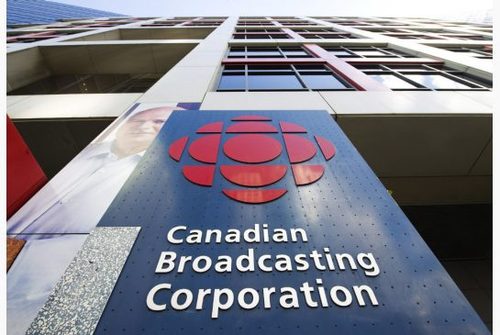EDITORIAL: The CBC -- Boon or Boondoggle?
The Canadian Broadcasting Corporation (CBC) is Canada’s national radio and television broadcaster — loved by many, reviled by others. Its exact date of origin may be open to interpretation; its predecessor, the Canadian Radio Broadcasting Commission, was established as a state-owned company in 1932, following a 1929 report that raised concerns about Canadian airwaves being taken over by American radio. In 1936, the organization was re-created as a Crown Corporation and re-branded with its present name. As for its purpose, the 1991 Broadcasting Act says,
“…the Canadian Broadcasting Corporation, as the national public broadcaster, should provide radio and television services incorporating a wide range of programming that informs, enlightens and entertains;
- be predominantly and distinctively Canadian,
- reflect Canada and its regions to national and regional audiences, while serving the special needs of those regions,
- actively contribute to the flow and exchange of cultural expression,
- be in English and in French, reflecting the different needs and circumstances of each official language community, including the particular needs and circumstances of English and French linguistic minorities,
- strive to be of equivalent quality in English and French,
- contribute to shared national consciousness and identity,
- be made available throughout Canada by the most appropriate and efficient means and as resources become available for the purpose, and
- reflect the multicultural and multiracial nature of Canada.”
That all makes for a tall order, and one that a for-profit broadcasting company might be unlikely even to attempt.
Other countries have publicly-funded national public broadcasting, too, though not built on exactly the same model.
Over the years of Steven Harper’s Conservative party government, CBC’s funding was cut and it lost over 2000 employees as a result. Formerly nearly ad-free, the CBC took to supplementing its reduced financial resources with more advertising income. Now, with the Liberal government restoring some of the CBC’s lost funding, those who revile the CBC are reviling it afresh.
A recent fund-raising e-mail sent out by Conservative Member of Parliament Peter Van Loan has attacked the CBC and indicated that restoring its funding to previous levels or more is “Liberal abuse” of taxpayer money.
This e-mail roused the ire of an organization called “Friends of Canadian Broadcasting.” The first paragraph on the “Friends” website’s “About Us” page says,
“Formed in 1985, FRIENDS of Canadian Broadcasting is an independent, Canada-wide, non-partisan voluntary organization supported by 180,000 households whose mission is to defend and enhance the quality and quantity of Canadian programming in the Canadian audio-visual system. FRIENDS is not affiliated with any broadcaster or political party.”
Whether or not one is inclined to believe the various assertions about the CBC in Van Loan’s fund-raising e-mail, it’s worth considering the “Friends” responses to those assertions.
Van Loan assertion #1: “For years, critics of the CBC have watched the network carelessly spend the more-than-generous taxpayer funding they receive.”
“Friends” response: “According to a 2016 Nordicity Analysis of Government Support for Public Broadcasting, among 18 major Western democracies, Canada, at $29 per inhabitant, was third lowest in terms of the level of per capita public funding for public broadcasting in 2014. The highest – Norway at $180, the lowest – the United States at $3, the average being $89 (Canadian dollars).”
Van Loan assertion #2: “While other networks have had to rely on privately funding their news, CBC had little to worry about. Funding kept going up, and the CBC became more and more out of touch.”
“Friends” response: “During their 10 years in office, the Harper Conservatives cut CBC’s annual funding by $115 million – and that’s not taking into account the impact of inflation on CBC’s buying power during that time.”
Van Loan assertion #3: “Despite the 2016 budget handing Canadians a $30 billion deficit, the Trudeau Liberals somehow managed to find an extra $150 million for the public broadcaster.”
“Friends” response: “The government’s Supplementary Estimates (B), 2016/2017, tabled on November 26th included $75 million in additional funding for the CBC (as promised in the Liberal’s first budget) – not $150 million as the Van Loan email claims.”
Van Loan assertion #4: “Now the CBC is asking for even more. A whole lot more! In their pre-budget submission, the CBC asked for another $400 million per year. For those keeping track, that’s $1,600,000,000.00. Every single year.”
“Friends” response: “The $400 million increase proposed by CBC President Hubert Lacroix is premised on the CBC relinquishing all ad revenue and therefore ending competition for scarce advertising dollars with private broadcasters and media outlets. Cost per citizen would rise from the current $31 to $46 – moving Canada into 4th place from the bottom (just ahead of Italy) from 3rd lowest out of the 18 countries that are part of the Nordicity survey. Lacroix also proposed tying CBC’s funding to the five-year licence renewal cycle to de-politicize the CBC’s funding process.”
Van Loan assertion #5: “When it comes to the CBC, it seems it’s just never enough. With hemorrhaging deficits and massive Liberal tax hikes on the way, this is spending that Canadians simply can’t afford.”
“Friends” response: “The $75 million in additional funding the CBC is receiving this year represents 0.25% (one-quarter of one percent) of the $30 billion deficit Van Loan refers to. In year two, when the additional funding rises to $150 million, that’s 0.5%. Even if the government were to agree to increase CBC’s parliamentary allocation by a further $400 million to eliminate all ads on the CBC, the total of $550 million in additional spending would represent less than 2% of that $30 billion.”
My take on this clash: I suspect the “Friends” have their facts right, and that Van Loan has been using opinion in place of fact, or at least to colour it very strongly.
It’s a matter of opinion whether or not a national broadcasting corporation is a worthwhile expenditure of taxpayer funds and if so, whether or not it should remain independent of advertising by being fully government-funded. A number of other nations have voted with their taxpayer dollars for funding national broadcasting, and most of them fund it to a higher level per citizen than Canada does.
Apparently the Liberal Party is willing to fund the CBC to a higher level than the Conservative Party, judging by Van Loan’s e-mail and the funding cuts to the CBC under Steven Harper, and by the restoration of those funds to the CBC by the current Liberal government. Conservative leadership candidate Maxime Bernier wants to reduce funding to the CBC and have it move to a PBS (United States public broadcasting) model, with fundraising drives and corporate sponsorships. Kellie Leitch, another Conservative leadership candidate, says, “The CBC doesn’t need to be reformed, it needs to be dismantled.”
Where do the other parties stand? The New Democratic Party promised to restore funding to the CBC if elected. The Green Party of Canada refers to the CBC as “one of our nation’s most important cultural institutions” and wants it to have stable funding.
Going back to the mandate of the CBC as outlined in the 1991 Broadcasting Act, I think those goals seem worthwhile in a country as large and diverse as Canada, with most of its population so close to a very long border with the United States and its powerful broadcasting facilities.
Considering the current overheated, frenzied and non-factual state of some reporting in for-profit media in the neighbouring nation to our south, I prefer what I conceive to be our Canadian national identity to remain and, especially in these times, to be strengthened. Perhaps the CBC plays a valuable and underestimated role in that. Perhaps the CBC is one of those services that are well worth paying for.
























